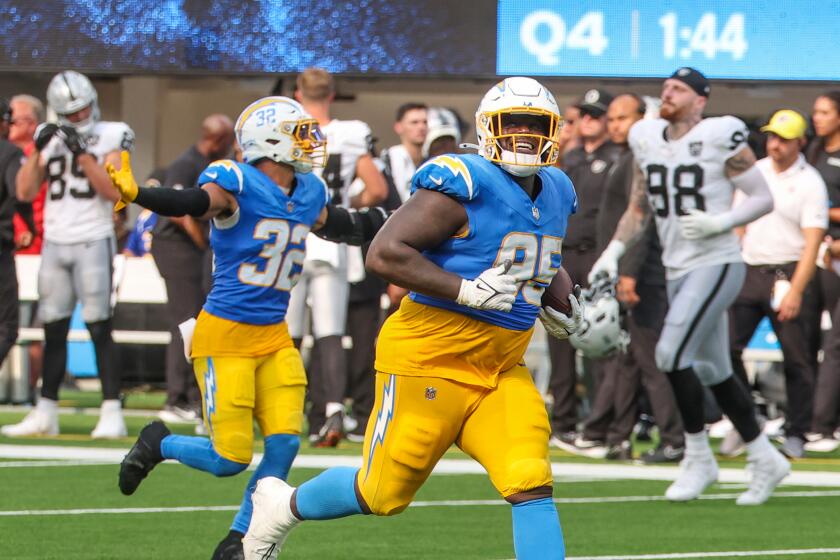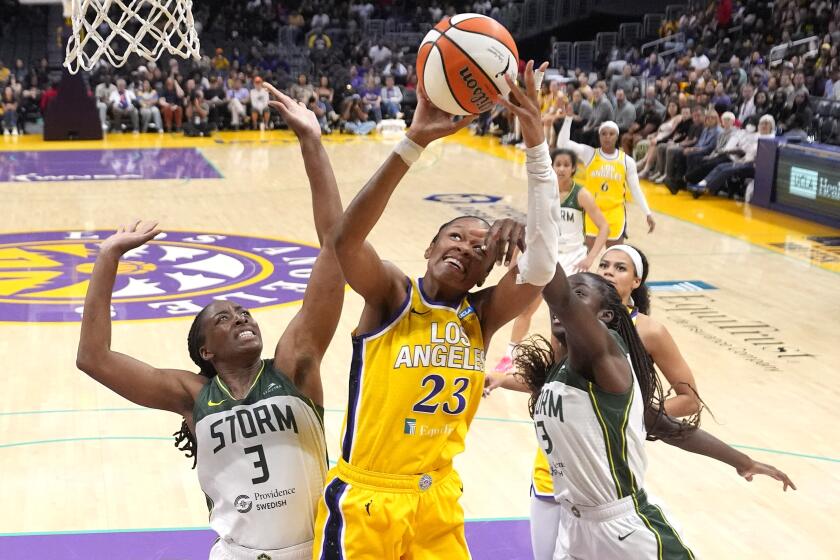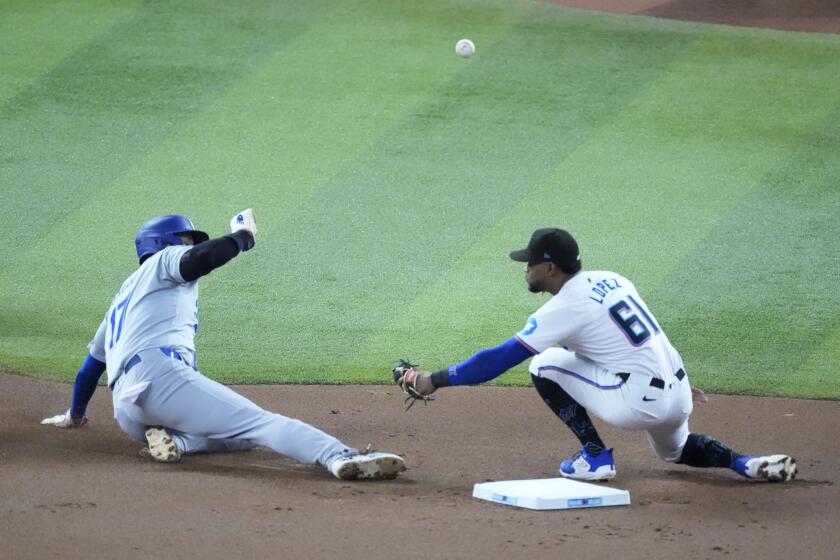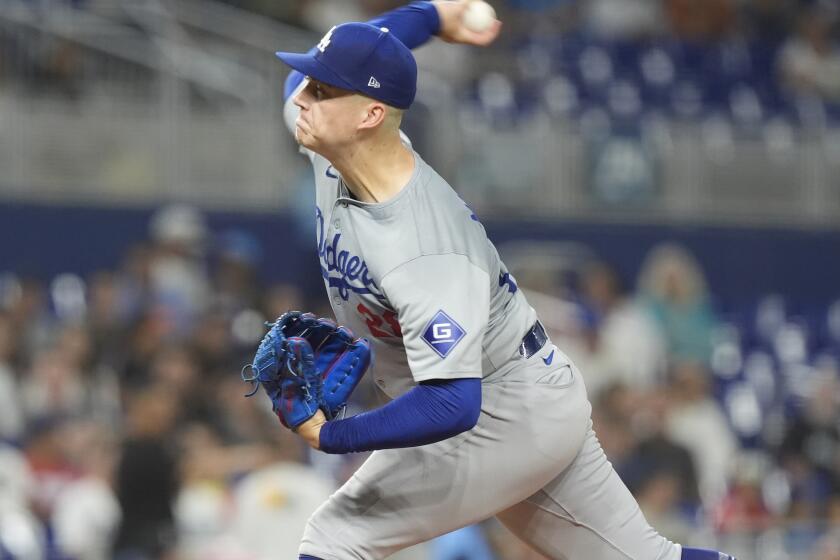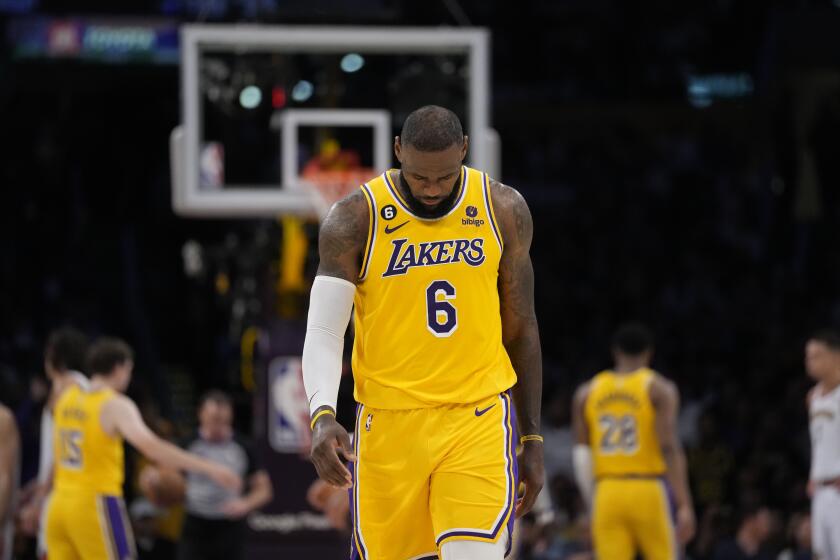It’s time to address sports doping in a different way
We’ve tried blame. We’ve tried shame. We’ve tried hard punishment.
But on the doping-in-sports front, we’re making very little real progress. Suspicion still reigns. Chemists remain ahead of the testers. Every other week there’s a new bust.
We’ve hit a wall.
There are the athletes who get caught and then, invariably, smile and smirk, duck and dodge, taking as little responsibility as possible.
There are those, like me, who feel moral outrage -- that altering the body this way should never be condoned. Our voices are growing faint.
There are the hordes who’ve begun to tune out the whole issue despite feeling, deep in the gut, that something is really wrong: that our games, and by extension society, have been tarnished by widespread doping.
Let’s try a new approach. It’s time to seek higher ground: accountability, responsibility -- and yes, forgiveness.
When I think of forgiveness, I think of South Africa. Remember how that nation, after its long and brutal history of apartheid, sought higher ground by establishing the Truth and Reconciliation Commission? In public hearings, all sides, oppressor and oppressed, had their say. Emotions were laid bare, honest stories were told, the most painful stories imaginable. Instead of half-truths and deflections, people who’d done terrible things saw up close what they’d wrought and began to own up.
It wasn’t about putting people in jail, it was about moving on, about not making the same mistake twice. Without this brave undertaking, we’re probably not heading to South Africa for next year’s soccer World Cup.
What happened in South Africa was an example of “restorative justice,” a concept that has roots spreading to ancient Greece and, on this continent, to the Native Americans.
It effectively dealt with apartheid. Let’s use it to help deal with doping in sports.
Take baseball as an example.
Thom Allena, a New Mexico-based authority on restorative justice who spends much of his time working with hard-core juvenile criminals, says baseball, like every other major sport, uses “the traditional punishment system” and it is adversarial.
“It’s about who did what. How can we punish them? How do we make it hurt?” he says. “Sometimes this is necessary. Sometimes there’s a better way. . . . A restorative approach asks who has been harmed. What has the harm been? It asks the accused, the victims, the people around them -- how do you feel about what happened? And finally, how do we go about repairing the damage?”
Remember 10 years ago, when UCLA football players sparked outrage by using forged signatures to procure disabled parking placards? Allena was called in. He brought all sides together in a room and got them to open up. It wasn’t perfect, it was often emotional and hard but healing happened. Allena says burly athletes and disabled students ended up working together to promote disabled rights on campus.
Restorative justice can happen in small groups. It can happen, as in South Africa, in tearful, tense public meetings. No matter what it looks like, it doesn’t look like what we have now in sports.
In the restorative mode, officials get out of the way. Lawyers, politicians, commissioners and the Justice Department take a back seat. And it isn’t easy.
Says Allena: “It takes a lot more courage for some gang banger to sit with his victims, see them, hear them, than for that guy to sit in a court with some lawyer who is elbowing him, telling him to shut up, telling him to keep a lid on it.”
If we were to use this approach in baseball, maybe it looks something like this: Manny Ramirez gets caught on a first offense and has two options -- a long suspension, say, 100 games, or he’s off for 25 games and agrees to try reconciliation.
If he chooses the latter, then at least a handful of times, he sits in a room with people who have been hurt by his actions. He has to see their faces, hear their stories. Maybe it’s a small group of season ticket-holders and their kids -- kids crushed by seeing their idol get busted. Maybe three minor league veterans are on hand, guys who’ve been scraping to get to the majors for 10 years, unwilling to cheat. Maybe Ramirez’s family comes, and he gets to see their tears and hear how hard all of this has been on them.
Ramirez lays it on the line too. He talks about what he did and the pressure athletes feel to be bigger, stronger, faster and ever young. He talks about growing up poor and the lure of doping to get mega-money. He talks about the fears so many of these athletes must have -- that what they’ve been doing for all that glory just might cut their life span in half.
In the end, Ramirez shoulders responsibility in a serious, meaningful way. He expresses remorse, and for this to work, he must feel it and those who are listening to his story must come away convinced. He commits to not just being clean but to doing something real in the community to fight steroids.
It doesn’t end there. This new openness and self-reflection shouldn’t be confined to the players but should extend to owners, labor bosses, Commissioner Bud Selig. If players are going to come clean, so do those in the power structure that has aided and abetted doping.
And while they’re at it, society at large gets no hall pass. We must begin taking a deep look in the mirror too. There’s our drive to win at all costs: doping is OK as long as our guy brings a championship. There’s our infatuation with enhancement: our own need to get bigger, stronger, faster, smarter . . . and ever young. We are hypocrites if we blame the athletes but not ourselves. (I include myself in this mix.)
Sure, maybe Ramirez goes along, and two weeks later his test comes back dirty. No system is foolproof. If this happens, we move him to the more traditional punishment approach.
And sure, the idea of Ramirez sitting in a circle, opening up, is preposterous. I use him here because he has become such a local symbol of broken trust. Then again, of the players who’ve been caught, I’m guessing there are some who’d love to take this option. A few players buy in and come away changed -- taking responsibility, making amends, bringing understanding, a sense of peace -- and restorative justice gains real and lasting clout.
Forgiveness takes hold, and heals.
It happened in South Africa. Why not in sport?
--
More to Read
Go beyond the scoreboard
Get the latest on L.A.'s teams in the daily Sports Report newsletter.
You may occasionally receive promotional content from the Los Angeles Times.





